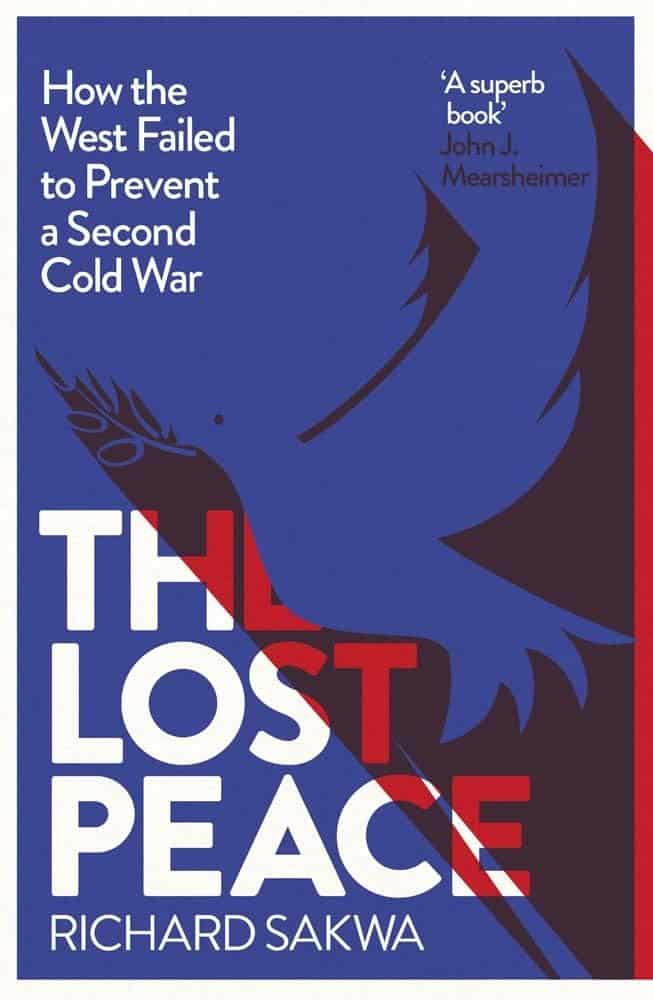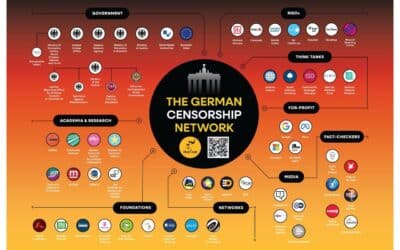The war in Ukraine is a complicated tangle of three wars in one. It is a civil war between Ukraine’s European leaning west and its Russian leaning east. It is a war between Ukraine and Russia. And it is a war between Russia and NATO.
Ben Abelow’s book, How the West Brought War to Ukraine, is a clear and valuable introduction to the decisions and events that led up to the war between Ukraine and Russia. Nicolai Petro’s The Tragedy of Ukraine is a comprehensive and masterful account of the history of the ethnic tension between the monist and pluralist visions of Ukraine that led to civil war and made Ukraine vulnerable to being caught up in the larger war between Russia and NATO.
Richard Sakwa’s new book, The Lost Peace, valuably fills the gap by addressing the larger war between Russia and NATO. It is a tour de force analysis of the wasted opportunity for peace at the end of the Cold War.
When Mikhail Gorbachev declared the end of the Cold War on December 7, 1988, a brief window for peace opened. But by the negligent failure to construct a new security structure in Europe that overcame the flaws of the previous one, the window Gorbachev opened was quickly closed. When Gorbachev received his peace prize in 1990, the Nobel Prize committee declared that “the two mighty power blocs, have managed to abandon their life-threatening confrontation” and confidently expressed the “hope that we are now celebrating the end of the Cold War.” But “The Cold War,” as U.N. Secretary General António Guterres has funereally said, “is back.”
How was that window of opportunity wasted? Why was the road from the Nobel Committee’s hope to the United Nations’ eulogy such a short one?
If the second cold war that we now find ourselves in is to end more hopefully, that failure will have to be deconstructed in order to find the clues for constructing a lasting and inclusive security structure upon which real peace can be built. Richard Sakwa, who has been called the preeminent Russia scholar of our day, provides timely help with his deconstruction of that failure.
There are two strengths that set The Lost Peace apart. The first is the wealth and depth of Sakwa’s knowledge. The second is that the book doesn’t just start with the shattering of the peace in Ukraine in 2014 that broke the dam for the new Cold War. In The Lost Peace, Sakwa analyzes the post Cold War world and identifies the conflicts and decisions that wasted the peace and led, once again, to war.
Sakwa argues that with the end of the first Cold War, there was a genuine chance for a very different world than the actual one being painfully played out in Ukraine; there was a genuine chance for a real peace.
But an arrogant America misunderstood Gorbachev’s offering of an international order that now transcended blocs and declared the victory of the American-led bloc and the dawn of a unipolar world. “By the grace of God, America won the cold war,” President George H.W. Bush arrogantly and misleadingly boasted in 1992. The young American hegemon, newly bloated with hubris, led the political West, hand in hand with NATO, on a global expansion that would soon close the cold peace and open the door to a new Cold War.
The U.S. rejected the opportunity it had been offered to build a new security structure. Instead, the U.S. declared not only the victory of the political West’s worldview, but its universality, and set out on a mission of enlargement that expanded to fill the whole world.
That is, the whole world but Russia, who alone was left out of the new security arrangement and ostracized as the new dividing lines in Europe moved ever closer to its borders and red lines until the whole strategy exploded in Ukraine, ending the possibility of peace and cementing the new Cold War.
Sakwa deconstructs the necessary security apparatus that was never constructed and demonstrates how, without that framework, the structure of the possible new peace so quickly collapsed. He identifies three crucial contradictions: sovereign internationalism versus liberal internationalism, international law versus the rules-based order, and freedom to choose versus indivisibility of security.
Russia was committed to sovereign internationalism, which emphasizes state sovereignty and the acceptance that different states develop different cultures and are at different stages of development of different forms of government. All are acceptable until they violate international law or human rights. The United States, however, took the perceived victory of the political West to mean the victory of the cultural West and set out on a mission to spread those values across the globe. They favored liberal hegemony over sovereign internationalism, asserting the universality of their beliefs. Russia, China, and the Global South resented that “great substitution” of the values of sovereign internationalism with liberal hegemony and the colonial missionary spread of the universal values of the West.
When the American policy of spreading Western values lacked the necessary approval of the Security Council, the U.S. enlarged the great substitution, usurping the authority of the Security Council and acting unilaterally without its approval. International resentment grew at this replacement of international law anchored in the UN with the rules-based order. The essence of international law is that written laws are applied universally. The rules-based order promoted by the West is composed of unwritten laws whose source, consent and legitimacy are unknown. To Russia and other countries not in the political West, they have the appearance of being invoked when they benefit the U.S. and its partners and not being invoked when they don’t. To those not in the political West, it appeared, disturbingly, that the U.S. and NATO had supplanted the U.N. as the arbiter of international law.
This belief was reinforced in Iraq and, especially, in Kosovo and Libya where the United States acted without Security Council approval in precisely the way they insisted that the rest of the world do not. Russia bristled at the double standard.
As long as liberal internationalism confined itself to the UN based international system, there was much about it that was attractive. But when the U.S. and NATO began their missionary project of spreading those universal values in ways that dismissed sovereign internationalism and international law, other nations felt their sovereignty and security being threatened.
And that led to the third contradiction. The U.S. insists on the free and sovereign right of states to choose their own partners and security alignments; Russia insists on the indivisibility of security, which insists that the security of one state cannot be purchased at the cost of the security of another. Both principles are enshrined in international law and in international agreements, and, with imagination and understanding, they could have been made compatible. But the United States, Russia argues, exclusively pursued the first in disregard of the second.
That conflict came to a head in Ukraine. American and NATO insistence, in violation of verbal promises made at the close of the Cold War, on NATO’s open-door policy and, especially, on Ukraine’s right to join NATO and NATO’s right to expand right up to Russia’s border was perceived by Russia as a security threat that crossed its reddest of lines.
The U.S. and NATO restated their promise of eventual NATO membership for Ukraine and increased military support. Russia felt that its security concerns were being ignored and that Ukraine was being built into a platform for threatening its existence. The U.S. overreached, Russia overreacted, and the second Cold War was a certainty.
If there is a weakness to Sakwa’s book, it is not in its argument nor in its evidence. It is in its reach to an audience. The Lost Peace is not an easy book. It is a book by a scholar steeped in the story that assumes at least a little of that knowledge by its audience. The Lost Peace is not a book for beginners. But for those with an interest in international relations, the book is an invaluable addition.
The Lost Peace despairs of the wasted opportunity to build a security structure that would have provided the architecture for a possible peace at the end of the Cold War. But it also ends with the hope that, having analyzed the contradictions, conflicts and failures to recognize the interests of others, we are able to find “new ways of thinking about old problems” and do better in the face of a new Cold War. Sakwa’s book is an invaluable contribution to that hope.
































